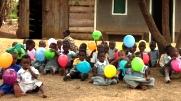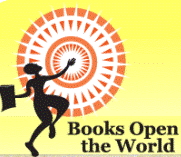Support to Girls and Women's Education
Project location: Uganda
Project start date: February 2007 -
Project end date: January 2009
Project number: 2006-49
Beneficiary: Books Open The World in Uganda
Uganda is a republic of nearly 30 million inhabitants, with two official languages ie English and Swahili.
During the nineties the country has been involved in numerous clashes with neighboring countries and in particular Sudan, with which for some time it has broken off diplomatic relations. In 1996, Uganda has intervened in the Congo War and from 1998 to 2003 in the second.
The problems of Uganda are precarious economy and a poor system of services, from education to health care. Uganda is inhabited by a variety of ethnic groups, of which the most important are the Bantu and Nilot. The Bantu are mostly concentrated in the south of the country, while other ethnic groups are located in the northern part.
In Uganda, girls represent 47% of total primary school and 32% of secondary school enrollment. The school dropout rate among girls, however, is very high, due to the high cost of education, teenage pregnancy, child labor, sexual violence and caring for sick relatives, which is almost always a task entrusted girls.
A UNICEF report in 2003 explains the reasons why girls are still lagging behind boys in education in Uganda:
1) poverty and the costs of education (books, uniforms etc..), The need for someone who carries out the housework, polygamy that involves about 30% of families and encourages families to pay for the education of boys instead of girls, as they remain within the family, while the girls will join a new family.
2) HIV / AIDS. If a family member is sick, the girls stay home to take care of him or her or begin to work to help the family budget.
3) early pregnancies: 35% of the girls are pregnant before age 17 and then are not allowed to return to school.
4) safety: girls often have to travel long distances on foot to go to school, and are often victims of sexual harassment by people encountered along the route. Also, many schools still use corporal punishment.
Foundation for Children's Education in Uganda / Books Open the World is an NGO founded with the intent to support the education of Ugandan children. The Foundation is open to all children and adolescents, boys and girls, who live in rural western Uganda, participating in their education at several levels: by providing textbooks, history books, scholarships for girls, after-school lessons, setting up libraries in villages and providing children opportunities for the future.
In particular, The Foundation assists three communities in western Uganda adjacent to Kibale National Park, that is the villages of Kanyawara, Kigarama and Kiko. For this project 3 elementary schools were chosen in Kanywara, Kiko and Kigarama and a secondary school in Kigarama, with the specific intent to support the education of girls and women in these villages.
The objectives of the project are threefold:
1. The after-school assistance to primary school students with learning problems, particularly for girls. Teachers will be employed for after-school support to assist students in the preparation of homework.
2. Establish a fund for secondary education for the best students, giving scholarships for secondary schools to girls in primary school with high grades, but who, because of poverty, are unable to attend secondary school. Six scholarships will be donated per year for a period of four years each.
3. Set up lessons for women to be held on weekends. Most Kibale women work at home and in the country, some work as a tailors or produce craft items and a few others have a small business. The program aims to recruit teachers for the weekend, to give lessons to groups of women also come from adjacent villages, organizing reading and writing courses in local schools and other courses at the choice of women. The aim is also to give women the opportunity to meet and work together for themselves and for their communities.






